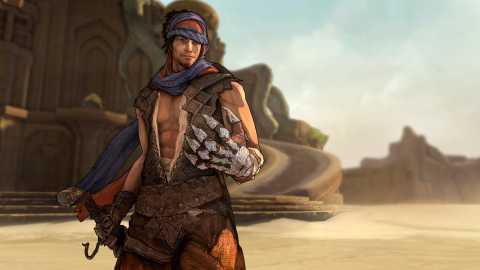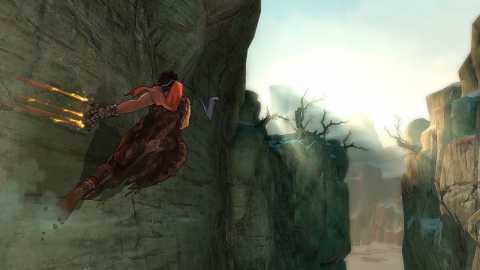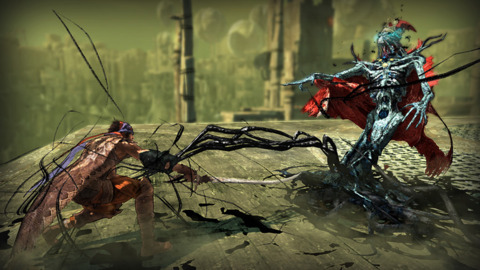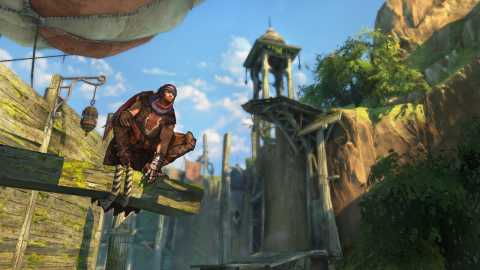
There's no connection whatsoever to the last Prince of Persia trilogy; this one starts fresh with an entirely different prince. Actually, he doesn't appear to be much a prince at all, but more of a roguish, tomb-raiding vagabond, a Han Solo of the desert who's in it for wealth and glory but hardly for honor. Too bad for him, he gets caught up with Elika, a do-gooding princess with magical powers who's bent on restoring beauty to her corrupted kingdom and cramming the culprit, the dark god Ahriman, back into his eternal prison. The story takes some unexpected turns here and there, and gets surprisingly poignant as it goes, culminating in an ending I didn't quite see coming. Naturally, there's a good setup for a sequel.

Of course, you get heaps and heaps of the wall-jumping, pole-climbing, superhuman gymnastics you'd expect from a Prince of Persia. This time around, you can add ring-swinging, roof-running, sliding, and even the occasional flight to your repertoire. These moves are all mixed up thoroughly enough that you have to stay on your toes to bust out the right move at the right time and avoid plummeting to your doom. There are enough different platforming mechanics here that the action stays varied, and certainly looks flashy enough.
But it's also easy as all heck. The game might as well present specific button prompts as you reach each handhold or wall-jump point; they're indicated right there in the level design anyway. If there's a horizontal scrape on the wall, you know you need to wall run there. If there's a ring, you hit one button to swing off of it. A pole jutting out of the ceiling, you hit a different button to dart across. It starts to feel a little like Platforming-By-Numbers after a few hours, but the prince looks so cool performing all these larger-than-life maneuvers that I never got totally bored with the traversal gameplay.
Even if the platforming was really tough in a demanding, skill-based way, you'd have no penalty and little frustration due to the game's wildly forgiving death mechanic. In short, you can't die. Every time you miss a jump, Elika teleports in with her fancy magical powers and delivers you back to the last solid ground you stood on. In combat, she pulls you back for a minute to rest while the enemy regains a little health. There's been all kinds of ballyhoo about this feature, and there's a psychological component at work for those people who say this makes the game too easy. There's still a failure mechanic here; it's just streamlined by really tight checkpoints and no load times in between failures. Otherwise the only difference is the lack of a specific "Game Over" screen.

This openness also works against the game's flow, however. There are four powers you have to unlock for Elika by collecting multiple quotas of light seeds, and each of the action stages requires you to have one of those powers to enter it. You can't clear out any of the bosses' areas entirely without having at least two of the powers, so three times throughout the game I found myself having finished every available level but still needing dozens more light seeds to gain the next power and open up more levels. I spent more of the game backtracking to completed levels, hunting for more seeds to let me progress than I would have liked.
Like the platforming, the combat emphasizes style--but doesn't sacrifice substance for it. The battles sometimes look like glorified Quick Time Events, especially with button prompts popping up here and there, but there's also a pretty robust combo system under the hood that lets you chain together sword attacks, grapples, acrobatic moves, and magical Elika attacks into really long, rewarding combos. There are infrequent, easy fodder enemies here and there, but the vast majority of the combat takes place against the four bosses: the hunter, the alchemist, the concubine, and the warrior. Each one pops up for a fight--and a dramatic exchange of dialogue--at least once in each of the levels within its domain, and they all have different fighting styles and back stories that really flesh out the sort of tragedies that led to their service of a dark god in the first place. You see and fight with them so much, the four enemies end up becoming pretty iconic by the time you actually face off with each one for the final time.

If Ubisoft really had to go and release a fourth Prince of Persia game in five years, I'm glad it turned out as good--and more importantly, as distinctive--as this one did. It offers the specific gameplay features that fans of the series will be looking for, while establishing a sequel-ripe new world and story arc that are every bit as engaging as those of the previous trilogy. The slightly uneven pacing and relative ease of the gameplay are minor nitpicks in the grand scheme of this engrossing, beautiful adventure.